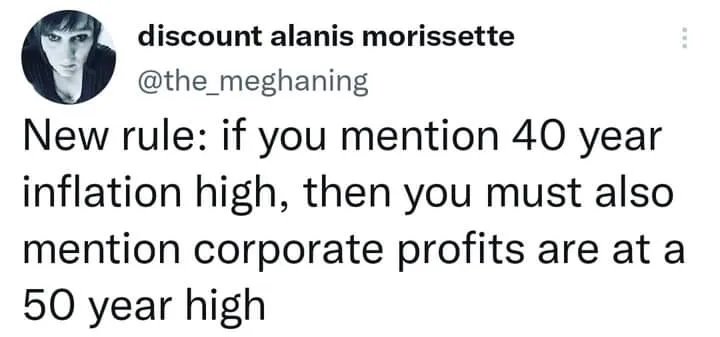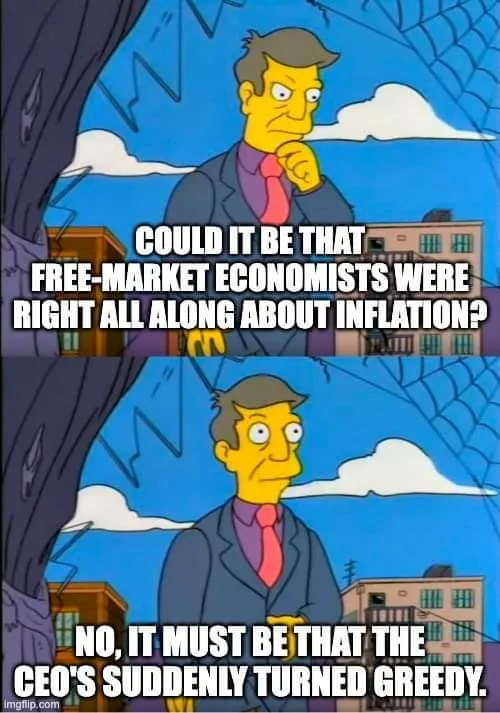There is a popular belief that the recent spike in prices is the fault of corporate greed and price-gouging. This superficial understanding of economics ignores the root problem, and worse still, often justifies more of the very actions which caused the problem in the first place.

An example I saw in a viral screenshot of this tweet
The intended conclusion of this tweet is that inflation and profits are somehow connected. I would like to know whether this is really causation, correlation, or mere coincidence for a better understanding of how the economy really works. Social media is a poor tool for serious discussion and Brandolini's Law is in full effect.
A while back, I tried to offer a brief overview of what really causes inflation, where I said the real trigger was an increase in the money supply.
All else being equal, when there are more dollars chasing the same goods and services, the prices must adjust to reflect this new money. We tend to think of money and wealth as synonyms, but what we really value are those goods and services. No new wealth was created, just new currency. The rise in prices is the consequence of fiscal policy, not the cause demanding new policy to be implemented.
Superficial comments about corporate profit ignore that these corporate interests were often the first beneficiaries of the majority of bailout funds. The simple issue of timing ensures the first recipients of new money can buy before prices adjust in response to the new money, and those further downstream see the prices adjust before a new market equilibrium can be achieved.
People mock trickle-down economics, but here we see the destructive version in action all around us for the past two years. If everyone suddenly got 10% more dollars, and all prices simultaneously rose 10%, there would at least be equilibrium, but what we see is a real-world temporal delay in the distribution of money and price adjustments resulting in extreme chaos as people try to figure out how to react to all these changes in market demand and money supply. Those lowest on the economic ladder get hit the hardest, while those at the top can often benefit.

Of course, that isn't the sole influence on the price changes we are seeing today. COVID policy severely disrupted the market and drove small businesses into the ground while ensuring people could still shop at the big box stores and online retailers. As a result, their corporate profits have been sky-high when there is increased demand, reduced competition, and lower supply of desired goods and services. The stimulus checks also created a spike in demand for goods without a corresponding increase in new production, and doubtless exacerbated the existing supply chain problems throughout the economy.
In the housing market, we see major corporate players sinking money into real estate, doubtless seeking a safe haven for the inflated money supply they got first. There is also a shift as people are emigrating from states where the COVID policies were the final straw in political frustration, leading to higher demand in places with less restrictions. On top of this, the Federal Reserve has until recently maintained artificially low interest rates, encouraging more people to borrow for mortgages or make investments in construction by sending bad signals of non-existent stored wealth to the market.
Price controls are always destructive, and interest rates are in essence just the price of borrowing money. The problems around us have been created by political intervention, a literal government monopoly in money, and decades of corporate collusion with government for regulatory capture, subsidies, bailouts, and sweetheart contracts at taxpayer expense. The consequences will, as usual, be blamed on "free market failure" and used to justify myriad new government regulations, bureaucracies, taxes, and surveillance which will only further entrench the corporate interests the Democrats claim to oppose, and stifle new mom-and-pop shops the Republicans keep claiming to champion.

Simpsons meme found in the wild
Now the major media figureheads and proper economists are finally noticing the inflation problem as it hits consumers. As I wrote in March of 2021,
After just a year of COVID lockdowns, many people are already living their lives in anticipation of "stimulus checks" as though the State can rain down manna from heaven.No one seems to see the reality behind the rhetoric. Spending on "COVID relief" is astronomical, and it is funded by debt and inflation that will haunt us even longer than the ripple effects of the lockdowns themselves.
About that time, the term "transitory inflation" was being used to hand-wave away concerns from people like me, but there were even signs of concern in the establishment media just two months later. Nonetheless, the people actually running the money manufacturing have only now started to respond with their response mechanisms. The problems of monopoly won't be truly fixed by that same monopoly though, so buckle up. It's gonna be a bumpy ride. Brace for inflation rescue "stimulus bills" and worse in response.
I offer no timetable, just the reminder that the laws of economics can't be overruled by the pride of politicians. I can't say when a house with a bad foundation will fall, but I can point to the cracks, offer warnings, and advise you to have a backup plan. Buy beans and bullets. Build local community connections. Invest in your own tools and skills so you can be the new economy when the status quo stumbles.

